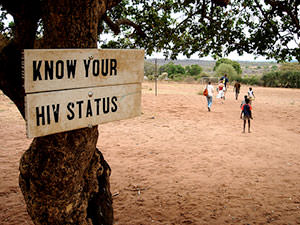|
To see long excerpts from “Tinderbox” at Google Books, click here.
|
“Tinderbox: How the West Sparked the AIDS Epidemic and How the World Can Finally Overcome It”
A book by Craig Timberg and Daniel Halperin
Just a few months ago, in Addis Ababa, Ethiopia, a leading firebrand of the global AIDS movement, Stephen Lewis, said at an AIDS conference that the money given to Africa by the U.S. global AIDS initiative called PEPFAR and by the Global Fund to Fight AIDS, Tuberculosis and Malaria amounted to “partial reparations” to the continent. Africa, he noted, was giving to the world thousands of health care workers whom it had educated, saving the West billions of dollars annually.
In his remarkable speech, Lewis, co-director of AIDS-Free World, said the payback was for multiple reasons: “From slavery to today’s extractive industries of minerals and oil, Africa is financing the world. The modern world’s economy was built on Africa’s human and natural resources, and it depends on them to this day. … We owe Africa what we give to Africa. And a hell of a lot more to boot.”
As Craig Timberg and Daniel Halperin suggest in their new book, “Tinderbox,” there may be another reason that the West should do more to fight the AIDS epidemic: Colonialists’ aggressive trade practices may have opened new travel routes in central Africa that helped spread a disease rooted in a dense forest to the world beyond.

Tinderbox: How the West Sparked the AIDS Epidemic and How the World Can Finally Overcome It
By Craig Timberg and Daniel Halperin
Penguin Press HC, 432 pages

Timberg, a Washington Post journalist, and Halperin, an epidemiologist and medical anthropologist at the University of North Carolina at Chapel Hill, write that researchers found a strain of the SIV virus among chimpanzees in the bush of the Congo River basin. The virus, which closely resembles a strain of the HIV-1 group M, the deadliest AIDS strain, traveled from chimps to humans through a cut or wound. Genetic testing has traced the origins back to the Kinshasa area, most likely arriving there in the blood of a worker in the bush meat trade. That worker spread the virus to others through sex. “Colonialists had had the effect of transforming the region into a tinderbox capable of creating the AIDS epidemic,” the authors write. “Then it fanned the flames.”
The theory outlined in “Tinderbox” could support the case for Africa reparations, or at least for more generous giving to fight AIDS. And, indeed, the fight against AIDS is particularly vulnerable now: Several European donors have cut their funding for the Global Fund in part because of the global economic crisis, and the Global Fund has canceled new rounds of giving until 2014. (The Obama administration has pledged to increase its Global Fund donation to $4 billion over three years; activists are arguing for $6 billion.)
Timberg and Halperin devote just the first sixth of the book to their exploration of the roots of the epidemic. The remainder is AIDS 101, focusing in particular on the last two decades. Readers unfamiliar with the epidemic will find it valuable. For those who know something about AIDS, the discoveries are few here — with perhaps one exception.That concerns the role of Halperin, who first met Timberg in 2005 when Halperin worked for the U.S. Agency for International Development in the tiny African kingdom of Swaziland. Timberg, who refers to himself in the first person and to Halperin in the third person (which is slightly awkward given they are both authors of the book), writes that Halperin often “veered quickly into the realm of the impolite.”
Halperin “insisted that the two most important factors in understanding and reducing the spread of AIDS through African societies were sexual behavior and male circumcision.” Other experts saw numerous other reasons for the spread of AIDS, and Halperin “made a career of telling people that most of what they think they know about HIV is wrong.”
Reporter, meet source, and source, meet an audience of your dreams: Washington powerbrokers. Reporters who cover global health need many Halperins to translate the science and lift a curtain on the messy politics of aid. Timberg writes that he and Halperin were an “odd couple,” but I think not. They needed each other, and “Tinderbox” does a good job of highlighting Halperin’s important role in the epidemic.

Tinderbox: How the West Sparked the AIDS Epidemic and How the World Can Finally Overcome It”
By Craig Timberg and David Palperin
Penguin Press HC, 432 pages

Halperin was one of a handful of researchers who forcefully argued for an expansion of male circumcision where it was not common. Male circumcision is a powerful preventive because it removes a part of the foreskin of the penis that can be easily infected by the virus.
U.S.-funded clinical trials supported their position in 2007, leading to PEPFAR’s increased funding of male circumcision over the past four years. It has been an uneven effort: The U.S. government helped pay for the circumcision of 1 million African males from 2008 through 2011, and President Obama has called for a goal of circumcising 4.7 million African men by the end of 2013.
Lewis and Halperin likely see the goal as laudable, but the time taken to reach it is lamentable. “Tinderbox” will help readers understand why the two men feel so strongly about this, and why the period ahead is so critical in fighting the epidemic. Millions of lives depend on the effort.
John Donnelly, a former Boston Globe reporter who covered global health from Washington and Africa, is the author of a forthcoming book, “A Twist of Faith: An American Christian’s Quest to Help Orphans in Africa.”
© 2012, Washington Post Book World Service/Washington Post Writers Group








You need to be a supporter to comment.
There are currently no responses to this article.
Be the first to respond.